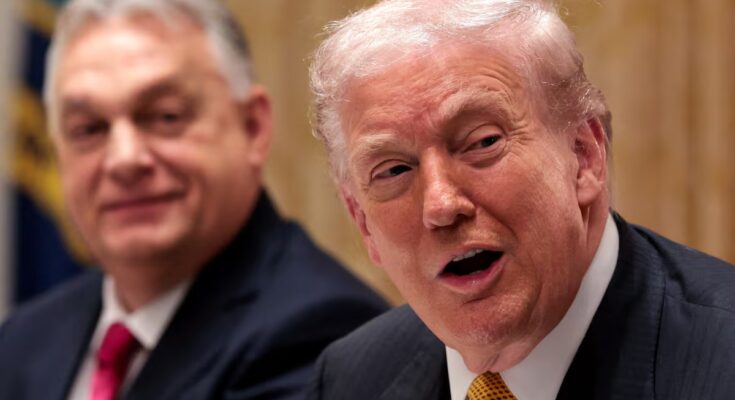The President of the United States, Donald Trump, has shown himself willing to allow Hungary to continue purchases of Russian gas and oil, as hoped for by Hungarian Prime Minister Viktor Orbán. In a meeting between the two at the White House this Friday, against the backdrop of the war in Ukraine and sanctions against Russia, Trump promised to study it. “It is very difficult for him to receive gas and oil from other areas, because his country does not have access to the sea or ports,” he assured.
The Republican pointed out that other countries in Europe that have access to alternatives also buy fuel from Russia. “We should ask better of those many European countries that buy from Russia,” he said.
Trump also opened the door to resuming the meeting he had scheduled with Russian President Vladimir Putin in Budapest, and which he canceled almost immediately after announcing it, frustrated by the Russians’ lack of flexibility in sitting down to negotiate a ceasefire and peace in Ukraine. “I would like to keep the meeting in Hungary, in Budapest. In the end I decided that I didn’t want it because I didn’t have the impression that anything important would happen. But if it happens, I would like it to be in Budapest.”
The event brought together two mutual admirers, who share a similar vision of the world and governing styles. Trump, who had already received Orbán at the presidential residence in 2019, during his first term, praised the authoritarian prime minister, calling him a “strong man”. The Hungarian wrote on the social network The Republican government has lifted some of the sanctions imposed by its predecessor as punishment for democratic failures in Hungary.
Much of the meeting would be devoted to the new sanctions that the United States has imposed on two of Russia’s major oil companies, Rosneft and Lukoil, and their subsidiaries. These punitive measures will come into effect on November 21st. Hungary is a big consumer of Russian energy: it imports 86% of its oil from war-torn aggressor Ukraine, according to an analysis by think tank Atlantic Council. If it does not receive an exemption, it could be subject to secondary sanctions for such purchases, which would represent a major blow to an already weakened economy as Orbán faces elections in April that are shaping up to be the most complicated of his term.
“(Orbán) asked for an exemption. We didn’t give it to him, but he asked for it. He’s a friend of mine. He asked for an exception,” Trump told the press accompanying him aboard the presidential plane last week. Air Force One.
Proximity to Moscow
The Hungarian was to be the guest of the summit between the presidents of the United States and Russia, Vladimir Putin, which was to be held in Budapest to discuss the ceasefire in Ukraine. But Trump canceled the meeting last October, frustrated by the Russians’ inflexibility in sitting down to negotiate with Kiev.
At the time, announcing the summit project, Trump stated that Budapest was chosen because both he and Putin maintain an excellent relationship with Orbán. The Hungarian – like the American until frustration with Putin led him to change his mind – maintains positions close to Moscow on the war and underlines that supporting Kiev is equivalent to “supporting the war”. Orbán favors ceding Ukraine’s territory to Russia to achieve a ceasefire, argues that Hungary should do nothing for Ukraine, and has obstructed or blocked measures for Kiev within the European Union, where he forced a delay in a $50 billion aid deal for Ukraine.
For Orbán, the visit to the White House represented an opportunity to present to his citizens the image of a respected world leader and a man of peace who defends the interests of his country. His trip to Washington takes place five months before the parliamentary elections in his country, in which, for the first time since he came to power, the authoritarian leader’s party, Fidesz, finds itself in difficulty. The polls give an advantage to the main opposition party, Tisza, led by Peter Magyar.



